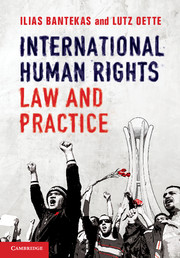Book contents
- Frontmatter
- Contents
- List of abbreviations
- Table of Cases
- Introduction
- 1 International human rights law and notions of human rights: foundations, achievements and challenges
- 2 International human rights law: the normative framework
- 3 Human rights in practice
- 4 The United Nations Charter system
- 5 The UN human rights treaty system
- 6 Regional human rights treaty systems
- 7 Individual complaints procedures
- 8 Civil and political rights
- 9 Economic, social and cultural rights
- 10 Group rights: self-determination, minorities and indigenous peoples
- 11 The human rights of women
- 12 The right to development, poverty and related rights
- 13 Victims’ rights and reparation
- 14 The application of human rights in armed conflict and the international criminalisation process
- 15 Human rights and counter-terrorism
- 16 Non-state actors and human rights
- 17 Globalisation and its impact on human rights
- Index
Introduction
- Frontmatter
- Contents
- List of abbreviations
- Table of Cases
- Introduction
- 1 International human rights law and notions of human rights: foundations, achievements and challenges
- 2 International human rights law: the normative framework
- 3 Human rights in practice
- 4 The United Nations Charter system
- 5 The UN human rights treaty system
- 6 Regional human rights treaty systems
- 7 Individual complaints procedures
- 8 Civil and political rights
- 9 Economic, social and cultural rights
- 10 Group rights: self-determination, minorities and indigenous peoples
- 11 The human rights of women
- 12 The right to development, poverty and related rights
- 13 Victims’ rights and reparation
- 14 The application of human rights in armed conflict and the international criminalisation process
- 15 Human rights and counter-terrorism
- 16 Non-state actors and human rights
- 17 Globalisation and its impact on human rights
- Index
Summary
The gap between the promise embodied in international human rights law and actual practice is frustrating, as those working in the field know only too well. A critical observer may well turn round saying ‘I told you so, your belief in the power of law was mistaken in the first place’. Yet a believer in the system may counter, ‘yes, we are facing some problems, but we’re still just at the beginning, we need more law and things will improve’. These opposing strands point to broader questions, namely whether human rights provide the best language to safeguard core values and, if so, whether law is a suitable vehicle to promote, protect and vindicate them. Posing the very question suggests that human rights law has somehow lost its innocence – or naivety – in the sense that it is no longer self-evidently good or considered able to provide solutions to the myriad contemporary challenges. This is not a bad thing: on the contrary. Human rights are born out of intense struggles and develop in constant contestation with power and power relations. The law on human rights is therefore at any given time a temporary reflection of an understanding that is already pregnant with future developments and challenges. Being aware of the contentious nature of human rights protects from developing self-congratulatory attitudes and guards against their misappropriation by elites. Ultimately, human rights are not something fragile out there that need protection. Instead, they are constantly claimed and developed if not made anew by multiple actors, all of us, who engage with them in one way or another, as rights-holders, advocates or otherwise, if only by reading this book.
- Type
- Chapter
- Information
- International Human Rights Law and Practice , pp. 1 - 8Publisher: Cambridge University PressPrint publication year: 2013



